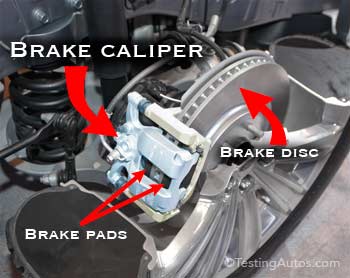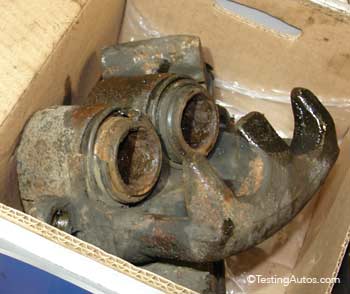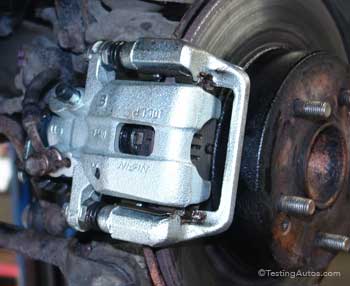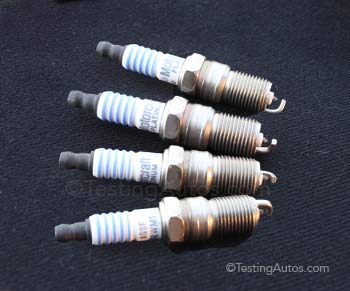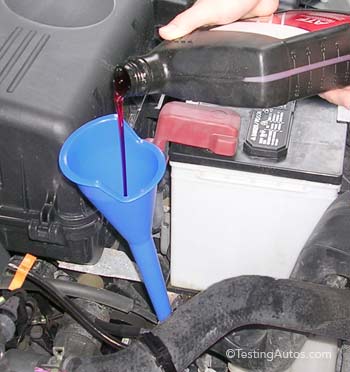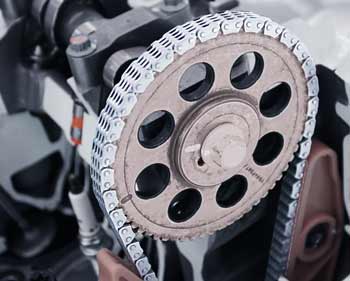When does the brake caliper need to be replaced?
In disc brakes, the brake calipers are the parts that apply brakes to each wheel. Majority of modern cars have disc brakes on all four wheels, so an average car has four brake callipers.The brake caliper holds the brake pads that are installed on each side of the brake disc (rotor). The brake disc rotates together with the wheel. See also the photo of the Brembo brake caliper.
When the driver presses the brake pedal, the hydraulic pressure forces the pistons inside brake calipers to extend. As a result, the brake pads squeeze the brake discs from both sides slowing or completely stopping their rotation. In many cars, the parking brake operates through rear brake callipers.
Brake calipers are the key components of the braking system. Most common problems with brake calipers are leaks, rust damage, seized or sticking pistons or guide pins. Seized brake caliper are also often damaged from overheating.
In general, car manufacturers recommend having the brake inspection done at least once a year; consult your vehicle's Owners's Manual for details. During brake inspection, mechanics check brake calipers for leaks, seized guide pins, sticking brake pads, broken caliper piston boots, sticking caliper pistons, etc. A failed or sticking brake caliper must be replaced.
What are the symptoms of a bad brake caliper?
- Leaking brake fluid from the wheel area. See the photo.
- Squeaking from one of the wheels while driving; often the noise changes or stops when brakes are applied.
- Overheating of one of the wheels.
- Smoke coming from one of the wheels.
- Brake caliper shows signs of overheating or mechanical damage.
- Brake drag, when the vehicle feels like it is not rolling freely.
- When brakes are applied, the vehicle pulls left or right, as if the braking effort is different between the left and right wheels.
- Parking brake is not holding the vehicle on a slope when applied, or not releasing fully.
Advertisement
Of course, signs of a failing brake caliper are not always obvious and these symptoms can be caused by other problems. The only way to tell if the brake caliper is good or bad is to have the brakes properly inspected by a qualified mechanic.
In some cases, a sticking brake caliper might just need to be freed and serviced instead of replacing. A brake caliper might also need to be replaced because of excessive rust damage. If a brake caliper shows signs of severe overheating, it will also need to be replaced.
Can I replace just one brake caliper?
Yes, it's OK to replace only the brake caliper that is bad. Your mechanic may recommend replacing both calipers on the same axle, but it's not necessary. It makes sense to replace both calipers if one has failed and the other shows signs of wear and is expected to fail soon. If you can afford replacing them both, why not replace the second one as a precaution? But if you want to save money, just change the bad one.How long do brake calipers last?
On average, brake calipers last over 100K miles. Brake caliper failures are much more common and often happen at lower mileage in the Salt Belt due to corrosion caused by road salt.We have seen rear brake calipers failing as early as 30,000 miles as a result of excessive corrosion caused by road salt use. Front brake calipers tend to last longer than rear calipers.
How much does it cost to replace a brake caliper?
Replacement of one brake caliper in an average car or SUV in a repair shop costs 1.0-2.0 hours of labor plus the part ($150-$370). Given the important role of the brake calipers, it's best to trust this job to a qualified mechanic and use only known good quality parts from a reputable supplier.Original (OEM) versus Aftermarket brake calipers:
Aftermarket or remanufactured brake calipers are often cheaper (although not always), but the quality is not consistent. We have seen aftermarket calipers that worked for many years, but it's also not uncommon to see them failing prematurely.For this reason, we recommend to consider both options: OEM and aftermarket. If the price is not much different, original (OEM) brake calipers bought from the brand dealer are always the safer choice. If your are replacing the rear brake caliper in a vehicle with electronic parking brake, it's best to use an OEM part.
Do brake calipers require any maintenance?
Yes. Brakes including the calipers need to be serviced regularly to make sure the brake pads are moving freely, the guide pins are not seized and the caliper is working properly. Servicing brakes typically includes cleaning parts of the brake setup and lubricating parts that need to be lubricated. Repair shops charge 0.8-1.0 hours of labor plus some shop supplies to service brakes on one axle.Read Next:
How often do brakes need to be serviced?
When should struts and shock absorbers be replaced?
When do coil springs need replacing in a car?
How often should the wheel alignment be done?
When do the control arms need to be replaced?
When do the ball joints need to be replaced?
When Should Tires be Replaced in a Car?
How often do brakes need to be serviced?
When should struts and shock absorbers be replaced?
When do coil springs need replacing in a car?
How often should the wheel alignment be done?
When do the control arms need to be replaced?
When do the ball joints need to be replaced?
When Should Tires be Replaced in a Car?
